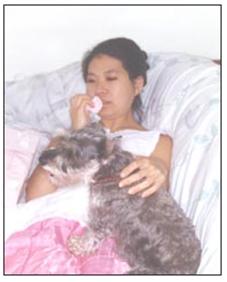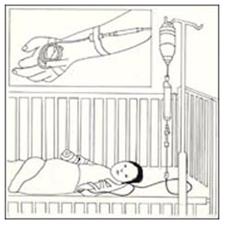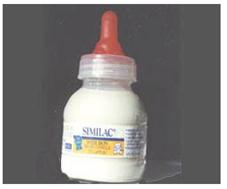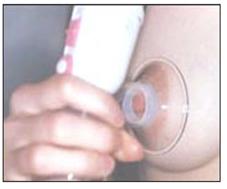수유모가 감염병으로 아플 때와 모유수유, When a nursing mother gets sick from infectious diseases
- 정신질환, 심장병, 신장병, 감염성 질환, 폐결핵 등의 질병으로 심하게 앓는 수유모가 모유수유를 하는 것은 수유모 자신에게도 아기에게도 해로울 수 있다.
- 박테리아나 바이러스 등 병원체의 감염병으로 앓는 수유모가 모유를 수유하면 수유모에게 있는 감염병을 일으킨 병원체가 젖 먹는 아기에게도 감염될 수 있다.
- 이런 이유로 수유모가 어떤 감염병으로 앓을 때는 그 감염병의 종류와 중증도 등에 따라 모유수유를 완전히 중단해야 할 때도 있다.
- 감기, 바이러스성 기관지염, 바이러스성 인두염 등 바이러스성 상·하기도 감염병을 경미하게 앓을 때 대부분의 수유모들은 보통 때 수유하는 것처럼 모유수유를 계속 할 수 있다.
- 그러나 이런 때도 모유수유를 계속 해도 수유모와 젖 먹는 아기에게 괜찮은지 의사에게 문의한 다음 의사의 지시에 따라 모유수유를 계속 하는 것이 더 좋다.
- 이때도 수유모가 아기에게 젖을 먹일 때 아기가 바이러스나 박테리아에 감염될 수 있기 때문이다.
- 수유모가 어떤 상·하기도 감염병을 앓고 있다는 진단을 받았을 때는 수유모가 앓고 있는 감염병을 일으킨 바이러스 병원체가 젖 먹는 아기에게 이미 감염되어 있는 경우가 대부분이다.
- 수유모가 바이러스성 상기도염이나 위장염 등으로 경미하게 앓을 때 젖 먹는 아기를 수유하는 엄마로부터 격리시키는 처치는 대부분의 경우 별로 효과가 없다.
- 그러므로 그때그때 상황에 따라 수유모와 젖 먹는 아기를 격리시킬 것인가 또 계속 모유수유를 할 것인가를 의사에 지시에 따라 결정해야 한다.
- 예를 들면, 수유모가 감기를 경미하게 앓을 때 그 감기를 일으킨 바이러스에 감염되지 않도록 수유모로부터 아기를 격리시키는 것은 일반적으로 권장하지 않는다.
- 활동성 폐결핵을 앓고 있는 수유모는 아기에게 결핵균을 감염시킬 수 있기 때문에 아기에게 모유수유를 해서는 안 된다. 젖 먹이는 엄마가 폐결핵을 처음 진단받은 후 폐결핵의 증상이 경미해도 아기에게 모유수유를 권장하지 않는다.
- 에이즈를 앓는 엄마는 아기에게 모유를 수유해서는 안 된다. 그러나 Antiretroviral drugs 등 항바이러스제로 에이즈를 치료 받는 수유모의 모유를 먹는 아기에게 에이즈 바이러스를 감염시킬 가능성이 낮다(참고: Infectious Diseases In Children, November 2004).
- 수유모가 어떤 병으로 병원 입원치료를 받고 있거나 집에서 앓고 있을 때 아기에게 모유수유를 해도 되는지 의사에게 문의해 결정해야 한다.(부모도 반의사가 되어야 한다 ― 소아가정간호백과 – 제 7권 소아청소년 감염병- 결핵, 에이즈 참조)
- 전신마취 수술을 받고 깨어난 후에도 모유수유를 할 수 있을 정도로 건강한 산모는 아기에게 모유를 수유해도 된다.
- 병원 규칙에 따라 입원 중 병원에서 모유를 수유할 수 있다. 수유모가 수유할 수 있을 정도로 건강하지만 병원 규칙상 병원에서 모유를 수유할 수 없을 때는 젖을 짜서 그 짠 젖을 우유병에 담아 집에 있는 아기에게 먹일 수 있다.
- 젖 먹는 아기가 어떤 병으로 병원에 입원했을 때도 입원한 아기가 젖을 먹을 수 있을 정도로 건강하고 병원 규칙상 모유를 병원에서 수유할 수 있다면 병원에 입원하고 있는 아기에게 모유수유를 해도 된다.
- 그러나 병원 규칙상 입원한 아기에게 젖을 먹일 수 없을 때는 인공영양 등 보충용 영양을 먹이든지 집에서 짠 엄마의 젖을 갖다가 병원에서 먹일 수 있다.
- 아기가 너무 아파서 엄마의 젖을 빨아먹을 수 없을 때도 있다. 아무 것도 경구로 먹을 수 없을 때도 있다. 이럴 때는 손이나 유축기로 젖을 짜서 냉장고에 보관했다가 나중에 먹일 수 있다.

사진 4-181. 수유모가 아플 때
Copyright ⓒ 2011 John Sangwon Lee, MD., FAAP

그림 4-35. 모유를 먹는 아기가 아플 때
Copyright ⓒ 2011 John Sangwon Lee, MD., FAAP

사진 4-182. 아기가 아프거나 어떤 이유로 엄마의 젖을 먹을 수 없으면 손으로나 유축기로 젖을 짜서 먹이거나 냉장고에 보관하거나, 인공영양을 먹일 수 있다.
Copyright ⓒ 2011 John Sangwon Lee, MD., FAAP

사진 4-183. 수유모가 아프거나 어떤 이유로 모유를 수유할 수 없으면 손으로나 유축기로 젖을 짜서 젖병에 넣어 먹이든지, 냉장고에 보관하든지, 엄마의 젖 대신 인공영양을 먹일 수 있다.
Copyright ⓒ 2011 John Sangwon Lee, MD., FAAP
When a nursing mother gets sick from infectious diseases 수유모가 감염병으로 아플 때와 모유수유
Breastfeeding by a nursing mother who is severely ill with diseases such as mental illness, heart disease, kidney disease, infectious disease, and pulmonary tuberculosis can be harmful to the nursing mother herself and the baby.
When a nursing mother is suffering from an infectious disease of a pathogen such as bacteria or virus caused the infectious disease in the nursing mother can infect the nursing baby.
For this reason, when a nursing mother suffers from an infectious disease, it is sometimes necessary to completely stop breastfeeding her, depending on the type and severity of the infectious disease.
Most nursing mothers can continue breastfeeding as they normally do when they are mildly ill with viral upper and lower respiratory tract infections such as colds, viral bronchitis, and viral pharyngitis. However, even at such times, it is better to ask your doctor if it is okay for the nursing mother and the baby to continue breastfeeding, and then continue breastfeeding according to your doctor’s instructions.
Even at this time, when a nursing mother breastfeeds her baby, the baby can become infected with viruses or bacteria.
When a nursing mother is diagnosed with some upper and lower respiratory tract infectious diseases, in most cases the nursing baby is already infected with the viral pathogen that caused the infectious disease that the nursing mother is suffering from. When a nursing mother is mildly ill from viral upper respiratory tract infection or gastroenteritis, the treatment of isolating a nursing baby from a nursing mother is not very effective in most cases.
Therefore, depending on the circumstances, it is necessary to decide whether to isolate the nursing mother from the infant and whether to continue breastfeeding according to the instructions of the doctor.
For example, when a nursing mother has a mild cold, it is generally not recommended to isolate the baby from the nursing mother so that it does not become infected with the virus that caused the cold.
A nursing mother with active pulmonary tuberculosis should not breastfeed her baby because it can infect her baby with Mycobacterium tuberculosis.
After the nursing mother was first diagnosed with pulmonary tuberculosis, she does not recommend breastfeeding her baby, even if the symptoms of tuberculosis are mild. Mothers with AIDS should not breastfeed their babies.
However, the possibility of infecting the AIDS virus in breastfed babies of breastfeeding mothers who are treated with antiviral drugs such as antiretroviral drugs is low (Reference: Infectious Diseases In Children, November 2004).
When a nursing mother is being hospitalized or is ill at home, they should ask a doctor to determine if it is okay to breastfeed her baby (parents should also be at least half-doctors-Child and Family Nursing Encyclopedia-Volume 7 Pediatric and Adolescent Infectious Diseases). -See tuberculosis, AIDS)
A healthy mother can breastfeed her baby even after waking up after undergoing general anesthesia can breastfeed her baby.
Hospital rules allow breastfeeding in the hospital during hospitalization. When a nursing mother is healthy enough to breastfeed, but hospital rules cannot breastfeed in the hospital, the milk can be milked and the squeezed milk can be placed in a bottle and fed to the baby at home.
When a nursing baby is admitted to the hospital with any disease, it is okay to breastfeed a baby who is admitted to the hospital as long as the hospitalized baby is healthy enough to feed and can breastfeed in the hospital according to hospital rules.
However, when the hospital rules cannot feed the hospitalized baby, supplementary nutrition such as artificial nutrition can be given, or the mother’s milk obtained at home can be taken and fed at the hospital.
There are times when the baby is so sick that she can’t suck on her mother’s breast milk.
Sometimes she can’t eat anything orally. In this case, you can squeeze milk with your hand or breast pump, store it in the refrigerator, and feed it later.

Photo 4-181. When the nursing mother is sick. Copyright ⓒ 2011 John Sangwon Lee, MD., FAAP

Figure 4-35. When a breastfed baby is sick. Copyright ⓒ 2011 John Sangwon Lee, MD., FAAP

Photo 4-182. If the baby is sick or for some reason unable to feed the mother’s breast milk, it can be milked with her hand or with a breast pump, kept in the refrigerator, or fed with artificial nutrition. Copyright ⓒ 2011 John Sangwon Lee, MD., FAAP

Photo 4-183. If a nursing mother is sick or unable to breastfeed for some reason, either by hand or with a breast pump and feeding it in a bottle, storing it in the refrigerator, artificial nutrition can be fed instead of the mother’s milk. Copyright ⓒ 2011 John Sangwon Lee, MD., FAAP
출처 및 참조 문헌
- NelsonTextbook of Pediatrics 22ND Ed
- The Harriet Lane Handbook 22ND Ed
- Growth and development of the children
- Red Book 32nd Ed 2021-2024
- www.drleepediatrics.com 제1권 소아청소년 응급 의료
- www.drleepediatrics.com 제2권 소아청소년 예방
- www.drleepediatrics.com 제3권 소아청소년 성장 발육 육아
- www.drleepediatrics.com 제4권 모유,모유수유, 이유
- www.drleepediatrics.com 제5권 인공영양, 우유, 이유식, 비타민, 미네랄, 단백질, 탄수화물, 지방
- www.drleepediatrics.com 제6권 신생아 성장 발육 육아 질병
- www.drleepediatrics.com제7권 소아청소년 감염병
- www.drleepediatrics.com제8권 소아청소년 호흡기 질환
- www.drleepediatrics.com제9권 소아청소년 소화기 질환
- www.drleepediatrics.com제10권. 소아청소년 신장 비뇨 생식기 질환
- www.drleepediatrics.com제11권. 소아청소년 심장 혈관계 질환
- www.drleepediatrics.com제12권. 소아청소년 신경 정신 질환, 행동 수면 문제
- www.drleepediatrics.com제13권. 소아청소년 혈액, 림프, 종양 질환
- www.drleepediatrics.com제14권. 소아청소년 내분비, 유전, 염색체, 대사, 희귀병
- www.drleepediatrics.com제15권. 소아청소년 알레르기, 자가 면역질환
- www.drleepediatrics.com제16권. 소아청소년 정형외과 질환
- www.drleepediatrics.com제17권. 소아청소년 피부 질환
- www.drleepediatrics.com제18권. 소아청소년 이비인후(귀 코 인두 후두) 질환
- www.drleepediatrics.com제19권. 소아청소년 안과 (눈)질환
- www.drleepediatrics.com 제20권 소아청소년 이 (치아)질환
- www.drleepediatrics.com 제21권 소아청소년 가정 학교 간호
- www.drleepediatrics.com 제22권 아들 딸 이렇게 사랑해 키우세요
- www.drleepediatrics.com 제23권 사춘기 아이들의 성장 발육 질병
- www.drleepediatrics.com 제24권 소아청소년 성교육
- www.drleepediatrics.com 제25권 임신, 분만, 출산, 신생아 돌보기
- Red book 29th-31st edition 2021
- Nelson Text Book of Pediatrics 19th- 21st Edition
- The Johns Hopkins Hospital, The Harriet Lane Handbook, 22nd edition
- 응급환자관리 정담미디어
-
소아가정간호백과–부모도 반의사가 되어야 한다, 이상원
-
Neonatal Resuscitation American heart Association
-
Neonatology Jeffrey J.Pomerance, C. Joan Richardson
-
Pediatric Resuscitation Pediatric Clinics of North America, Stephen M. Schexnayder, M.D.
-
Pediatric Critical Care, Pediatric Clinics of North America, James P. Orlowski, M.D.
-
Preparation for Birth. Beverly Savage and Dianna Smith
-
Infectious disease of children, Saul Krugman, Samuel L Katz, Ann A. Gershon, Catherine Wilfert
- Pediatric Nutritional Handbook American Academy of Pediatrics
- 소아가정간호백과–부모도 반의사가 되어야 한다, 이상원
- The pregnancy Bible. By Joan stone, MD. Keith Eddleman, MD
- Neonatology Jeffrey J. Pomerance, C. Joan Richardson
- Preparation for Birth. Beverly Savage and Dianna Smith
- 임신에서 신생아 돌보기까지. 이상원
- Breastfeeding by Ruth Lawrence and Robert Lawrence
- Infectious disease of children, Saul Krugman, Samuel L Katz, Ann A. Gershon, Catherine Wilfert
- The Harriet Lane Handbook 19th Edition
- 제4권 모유, 모유수유, 이유 참조문헌 및 출처
- 제5권 인공영양, 우유, 이유, 비타민, 단백질, 지방 탄수 화물 참조문헌 및 출처
- 제6권 신생아 성장발육 양호 질병 참조문헌 및 출처
- 소아과학 대한교과서
- 그 외
|
Copyright ⓒ 2015 John Sangwon Lee, MD, FAAP 미국 소아과 전문의, 한국 소아청소년과 전문의 이상원 저 “부모도 반의사가 되어야 한다”-내용은 여러분들의 의사로부터 얻은 정보와 진료를 대신할 수 없습니다. “The information contained in this publication should not be used as a substitute for the medical care and advice of your doctor. There may be variations in treatment that your doctor may recommend based on individual facts and circumstances. “Parental education is the best medicine.” |